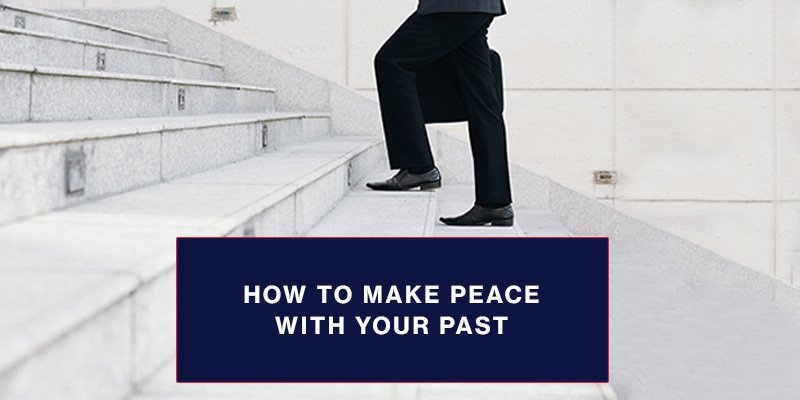In our last post, we talked about how our past can affect us and how our mind processes it, affecting not only in the way we perceive things, but also our physical health.
The daily rush that we are used to doing not let us realize that many things we are feeling are actually linked to things we are dragging along from our past, triggering emotions and stress in the present.
We also talked about why we should let go of the past. It is the best thing to do if we want to have a healthy body and a healthy mind. But, how can we start making peace with our past to eventually let it go and have the inner peace we are longing for? Here are seven steps that can help you accomplish it:
-
Self-acceptance and self-compassion
You are not your trauma, and your trauma does not define you. Wherever you are in your healing process, accept that that is where you are for now, and be gentle and patient with yourself as you progress. Treat yourself as you would treat a small child, having compassion for the most vulnerable part of yourself, and what you have been through. Practice treating yourself with loving kindness and the respect you deserve.
-
Practice forgiveness
While holding onto anger can serve to protect us from the pain that lies beneath it, eventually, it ends up hurting us and holding us back from being free and living the life we deserve. If you are holding onto self-blame, guilt, or shame, forgive yourself for being human and vulnerable – it is not your fault. If someone has hurt or betrayed you, forgiving them does not mean you have to condone their actions or accept their behavior, it is deciding that they no longer have power over you or your future.
-
Seek support
Isolating and withdrawing are common after a traumatic event, but it is important to stay connected to people and seek out someone safe who can support you and help you feel less alone. Speak to your family doctor about services available in your community, or seek the support of a therapist, pastor, or a support group, either in person or online.
-
Express your feelings
Your feelings are valid and important. When you commit to doing the work of feeling and processing your feelings, you will begin to release the trauma from your body and mind. Working with a licensed therapist is one of the most effective ways to do this, and they can provide access to evidence-based treatments including Cognitive Behavioral Therapy (CBT), to re-frame problematic thoughts and thought patterns, Eye-Movement and Desensitization Reprocessing (EMDR) therapy, where memories are processed without needing to relive the traumatic experience, and Somatic Experiencing, a body-based therapy to help release trauma held in the body.
-
Journal
You have the power to re-write your story and determine where you go from here. Documenting your healing journey can help you process thoughts and feelings and also deepen your therapeutic work.
-
Self-care
Taking good care of your physical health will support your mental and emotional health. Begin by eating healthy and nutritious food, getting plenty of rest, and making time for exercise. Trauma is stored in the body, so it is important to get regular exercise to help restore balance, and at the same time, vigorous exercise where the heart rate is elevated for even 20 minutes a day will help decrease anxiety and lift your mood and overall feeling of well-being.
Mindful breathing, also known as conscious breathing, can help keep you anchored in the present moment, bringing your attention back into your body when the mind wanders into the past or projects into the future.
Positive self-talk and affirmations are beneficial, too. Remind yourself that by overcoming the challenges of the past, you can face whatever life brings your way. You are stronger than you think, and having survived the past, you can now take control of the future.
-
Have an intimate relationship with God
When we take God’s hand and walk with Him, we become more and more aware of the good and bad things we have done in our lives, we understand what we have learned, we start living and appreciating the present and let go of the past. When we have an intimate relationship with God, we ask Him for His forgiveness, and He sees our true hearts and our true intentions, if we are being honest when asking for His forgiveness. So, when we receive His forgiveness, we start forgiving ourselves and forgiving those who have harmed us.
This way, our wounds can start healing, and our present becomes a new opportunity for us to start over and think about our future.
They are very powerful tools for us to use if we want to start letting go of the past and start healing from the inside. Our well-being is important, so we have to start taking care of our present so that we can enjoy it, and, in order to succeed, we need to star making peace with our past.
Do you know any other way to start making peace with our past? Have these steps helped you? Leave your answers in the comments section. God bless you.
References
van der Kolk, B. A. (2014). The body keeps the score: Brain, mind, and body in the healing of trauma. Viking.












